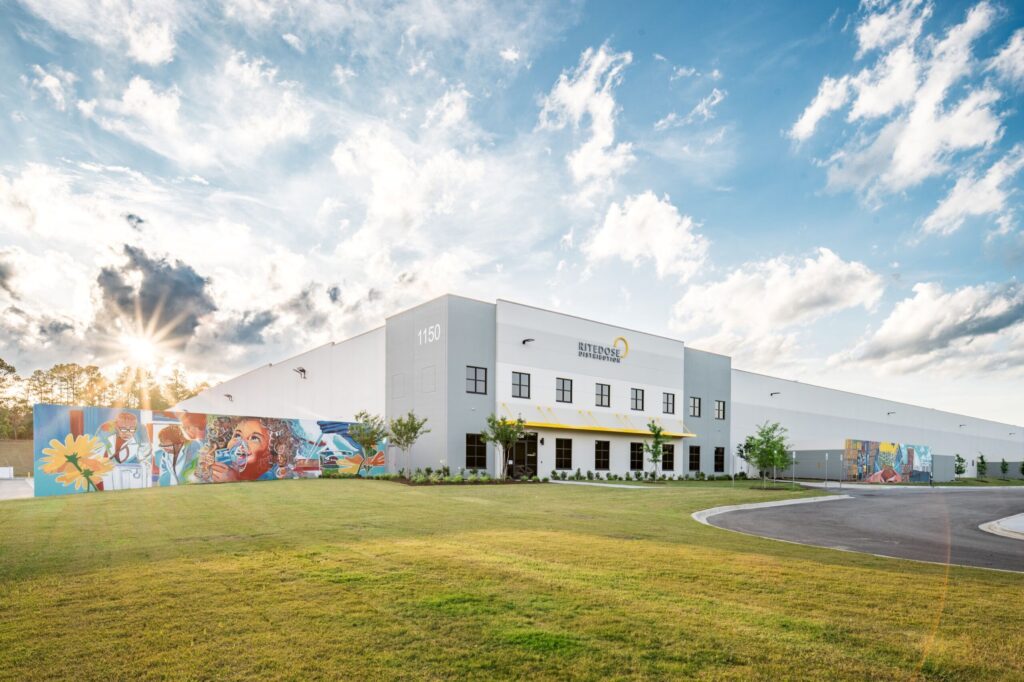When a German manufacturer of blow-fill-seal (BFS) equipment for sterile pharmaceutical products looked to expand into the United States three decades ago, it initially considered a California site, until the Golden State’s high manufacturing costs had the company looking for a less expensive alternative.
The manufacturer, Holopack Verpackungstechnik, established its U.S. outpost in 1995 as Holopack International and based it in South Carolina, where it grew beyond selling BFS equipment to using it for contract manufacturing for large and small biopharmas. Holopack’s owner, Hansen Corporate Group International, sold the U.S. company in 2009 to Stamford, CT-based Olympus Partners, which rebranded the company with its current name of the Ritedose Corporation.

“They decided, let’s put it close to a port,” Jody Chastain, Ritedose’s president and CEO, told GEN. “They chose South Carolina because of the Port of Charleston, as well as it was close to international airports with GSP (Greenville-Spartanburg International Airport), as well as Charlotte. So, we were centrally located here in Columbia, and it made sense at that time.”
That decision, Chastain said, continues to make sense for Ritedose, a contract development and manufacturing organization (CDMO) specializing in BFS technology and generic drug manufacturing. Ritedose passed through two other private equity owners before being acquired in 2022 by current owner Novo Holdings, the asset manager of the foundation that controls Novo Nordisk.
Since then, Ritedose has grown its workforce from 400 to 600 people and has carried out several facility expansions—including a $17 million, two-phase expansion of its in-house cGMP laboratory capabilities that is now in progress.
Phase I includes a new 10,000-square-foot analytical chemistry lab in a 225,000-square-foot distribution and logistics facility opened earlier this year at Ritedose Performance Park. Phase II entails converting the current analytical chem lab space in Ritedose’s main building into a 6,000-square-foot expansion of microbiology lab space and services. Construction of both phases is scheduled for completion in Spring 2026.
By creating a more efficient environment to streamline workflows and maximize productivity, Ritedose reasons that it can meet its growth capacity of 2.6 billion doses per year. Yet Chastain takes even greater satisfaction in a less tech-driven section of Ritedose’s facilities—a wall featuring family members of patients who have taken drugs manufactured by the company.
“I wanted to put them throughout the facility so that you see that we’re not making billions of doses a year for a faceless patient. We’re making them for our family members every single day,” Chastain explained. “It’s a very interesting dynamic that’s occurred over the past five to 10 years in South Carolina. We’ve had a number of players continue to invest and expand. Ritedose continues to invest and expand here.”
“The days when we were simply a textile and tire state have changed dramatically, right? Technology is growing, and life sciences is growing very quickly to where it’s no longer going to be, ‘Hey, what’s happening in Raleigh-Durham, in Research Triangle Park (RTP) in North Carolina,’” Chastain added. “South Carolina’s becoming a major player as well now in biotech and life sciences.”
Growing ecosystem
Ritedose is one of more than 1,000 life sciences companies to find its footing in South Carolina. The Palmetto State is home to a life-sci industry that grew 42% between 2017 and 2022—the sixth-highest state growth rate in the country, according to industry group SCbio. South Carolina’s life sciences industry consisted of 87,773 total jobs and generated an annual economic impact of $25.7 billion, a dollar value reflecting all goods and services attributed directly or indirectly to life-sci businesses in South Carolina, SCbio calculated in a 2022 report.

“I would never question an early-stage company if they say, ‘We’re going to locate in Cambridge or in Boston.’ I would say that makes total sense. But when you come here, because it is a growing ecosystem and highly, highly collaborative, you can get face time and you can get support,” James Chappell, SCbio, president and CEO, told GEN.
“It’s going to be really challenging for you to get those in a more saturated ecosystem because there’s just so much going on,” Chappell said. “Look, that’s a great problem to have. But when we meet with these innovative companies, a lot of times I do tell them that if you need an introduction to the president of the university, or the top researcher, or the governor for whatever reason—if you need a ribbon cutting, or all these things, it’s really easy to stand out, as long as you’re doing quality work and you’re hitting those milestones.”
Life-sci companies with top-tier innovation stand out another way, Chappell added: “You’re going to have more of your first pick from the talent who want to move to South Carolina, and those who are also graduating.”
Anchors for South Carolina’s life-sci industry include Clemson University and Medical University of South Carolina (MUSC) in Charleston. In addition to global biopharmas like AbbVie, AstraZeneca, Johnson & Johnson, Merck & Co., and Novartis, the state has facilities for service giants such as Charles River Laboratories and Thermo Fisher Scientific, plus home-grown companies.
In addition to Ritedose, home-grown companies include MitoChem Therapeutics, a Charleston-based developer of treatments designed to address the effects of mitochondrial dysfunction in neurodegenerative disease, and Nephron Pharmaceuticals, a West Columbia, SC, provider of contract manufacturing and outsourcing services for 503B compounded drugs and generic inhalation solutions.
Two-state partnership
South Carolina’s life sciences industry has attracted the attention of the Massachusetts Biotechnology Council (MassBio), the industry group for the Bay State—including Boston and neighboring Cambridge, MA, the nation’s leading region for life-sci activity, according to GEN’s most recent edition of its nationally-cited A-List of Top 10 U.S. Biopharma Clusters, published in August.
Over the past three years, MassBio and SCbio have partnered to nurture the growth of life-sci startups through the Drive program, a startup accelerator designed to advance the breakthrough science and technology of pre-seed companies, as well as equip their founders with the tools for long-term success. Drive is intended to enable startups to access the knowledge of industry experts, the guidance of experienced mentors, and the connections essential for life-sci success.
In September, SCbio and MassBio announced the selection of 10 startups for the Drive’s fall program—up from six companies chosen last spring in response to growing demand, according to the groups.
A cohort of five companies overseen by SCbio includes three neuroscience drug developers—Aquilus Pharmaceuticals (Winchester, MA), Neurodexis11 Therapeutics (Boston), and NeuroHope Therapeutics (Greenville, SC)—and two biologics developers, Altera Therapeutics (New Haven, CT) and Noara Therapeutics (Cambridge, MA).
Another five-company cohort, overseen by MassBio, consists of artificial intelligence (AI) “techbio” startups. They include Luminaria (Boston), Meta-Flux (Dublin, Ireland), and Reflector Bio (New York and Munich, Germany), as well as two startups that integrate 3D modeling with AI, Augment Biologics (Cambridge, MA), and InFocus Therapeutics (Boston).
Drive is free to all participants and does not take any equity from the companies it supports. During each eight-week hybrid program, Drive startups receive:
- Six industry-specific curriculum modules led by experts.
- Weekly sessions with a team of mentors tailored to meet your needs.
- Networking opportunities and industry connections throughout each cohort session, leading up to in-person Demo Days in Charleston and Boston.

“It isn’t just about Massachusetts. There’s incredible science happening all around the country and all around the world,” Kendalle Burlin O’Connell, MassBio’s CEO and president, told GEN.
“If we can take this foundation, the backbone that we have here in Massachusetts, and use it to support other burgeoning ecosystems, everyone wins: Massachusetts wins. Another state or country wins. But most importantly, patients win,” O’Connell said. “Let’s take a big tent approach, let’s use our strengths, and let’s see if we can do a better job of finding entrepreneurs, great science, and helping accelerate that science to bring it to patients faster.”
Mutual economic benefit
Both SCbio and MassBio acknowledge that their partnership offers a mutual economic benefit to their respective states, as some startups from outside Greater Boston and South Carolina have moved to one region or the other.
“Because of our network, they [startups] realize if they want their company to be successful, they need to start their company in one of our respective states and access the network and support system that we have to offer for them.”
SCbio’s membership of 200 is a far cry from the 1,700 members that MassBio enjoys.
“For us, it was not specifically about growing the membership. It was really about expanding the brand and continuing to cultivate our early-stage entrepreneur network through our innovation programs,” O’Connell said. “It was really about taking what we have here and finding great science wherever it’s happening and opening up, unlocking our network to help support that science. And it’s worked out wonderfully.”
Chappell said the partnership with Massachusetts has not only put South Carolina on the proverbial map for life-sci startups but has helped SCbio grow as well.
“It has shown people that we have access to things that they want to be a part of, and to resources. So, it’s an easy sell when we have maybe that early-stage company that is struggling with, should we use money to join, or should that go somewhere else?” Chappell said. “It certainly helped us with the earlier stage companies, and given us credibility, and shown people that we have access to resources that they want to be a part of. I’ve had a lot of people say, well, if Massachusetts sees something positive about the ecosystem and they want to partner, then there’s clearly something there, so I want to be a part of it, too. So, it has definitely helped us.”
Chappell said SCbio first connected with MassBio some four years ago when it agreed to join MassBio’s purchasing consortium as it was expanding beyond the Bay State.
“We are a much newer, fast-growing ecosystem with a lot of early-stage companies, so I knew that we had to help foster them. We have great companies coming out of the Medical University of South Carolina in Charleston, out of Clemson, but we need to build that ecosystem that obviously Boston and Cambridge, Massachusetts, have done so well,” said Chappell, who lived in the Boston region while holding consultancy positions from 2006–2013. “We need to unlock the mentors, the capital, all that Boston has so much of, all that Massachusetts has so many of—we need that in South Carolina.”
Surprising response
Chappell contacted MassBio, not expecting a positive response.
“Somewhat surprisingly, they said yes,” Chappell added. “It has been obviously great for us as we model a lot of what we’re trying to do and accelerate this growth in order to be a hub. Ultimately, with as many people moving to Charleston and Greenville and South Carolina in general, our goal is for South Carolina to become a new hub, and for people to recognize it when you talk about the Bostons, the San Diegos, and others, in unique ways.”
San Diego ranks fifth in GEN’s ranking of the nation’s top biopharma clusters.
“James was really interested in how can he get his member companies to participate in, and is it something that we would be interested in helping to launch in South Carolina?” O’Connell said. “Again, that big tent approach, that collaborative spirit, it made all the sense in the world to take the program we’d built here and had great success with, and expand it into South Carolina, and reach into the southeast of the country.”
Through the groups’ partnership, several Boston-area companies have connected with researchers and facilities at MUSC, as well as with investors based in the Southeast. “We obviously benefit greatly from the experience and the robustness and the talent that they bring,” Chappell said. “Even in this short time period, we’ve unlocked things that these companies would have never had the experience to know about, because they weren’t looking here. They don’t have connections here.”



